Unit 4 I used to be afraid of the dark Section A 3a—3c课件(共20张PPT) 人教版九年级全一册
文档属性
| 名称 | Unit 4 I used to be afraid of the dark Section A 3a—3c课件(共20张PPT) 人教版九年级全一册 |

|
|
| 格式 | pptx | ||
| 文件大小 | 4.4MB | ||
| 资源类型 | 教案 | ||
| 版本资源 | 人教新目标(Go for it)版 | ||
| 科目 | 英语 | ||
| 更新时间 | 2025-01-05 00:00:00 | ||
图片预览

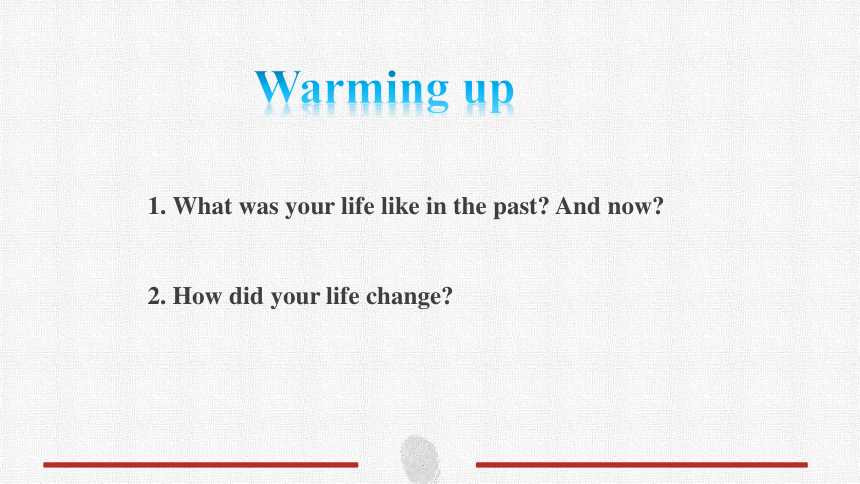


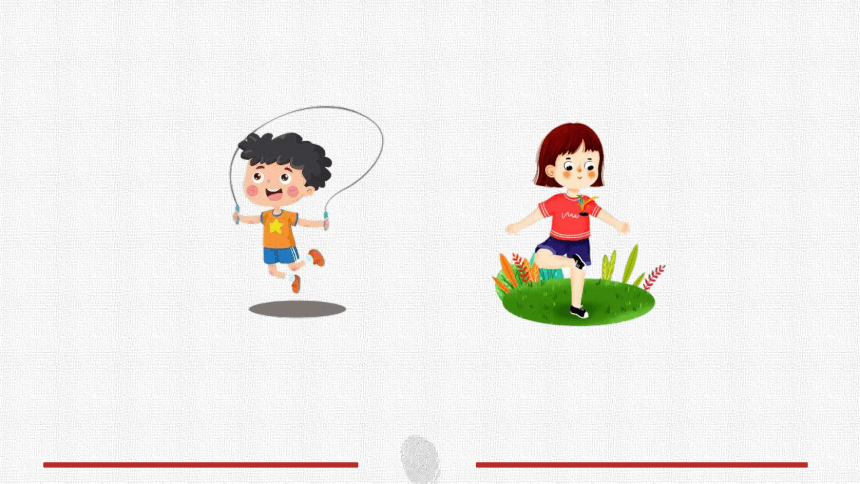
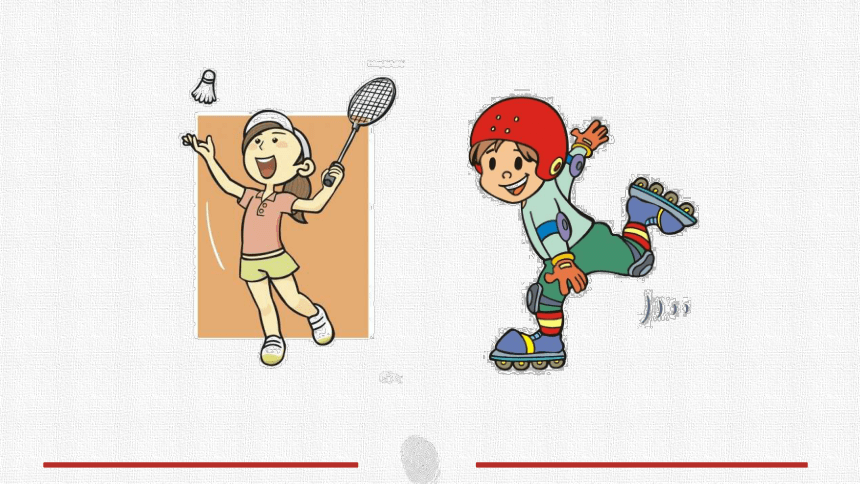
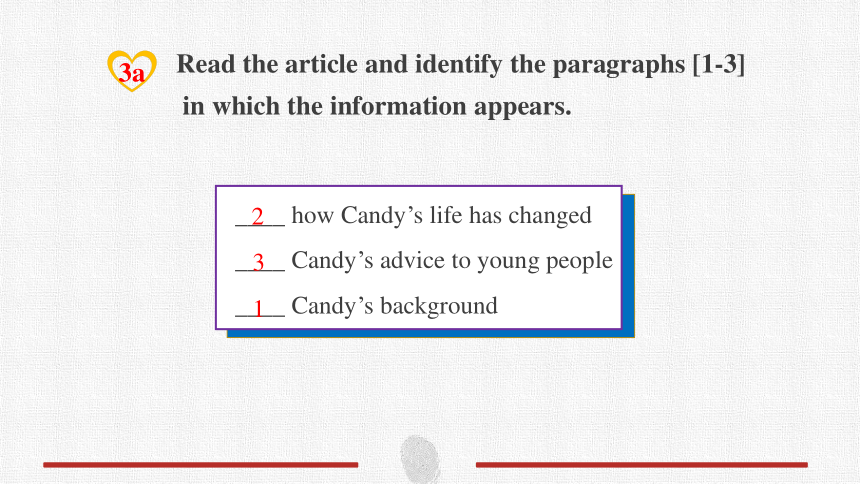
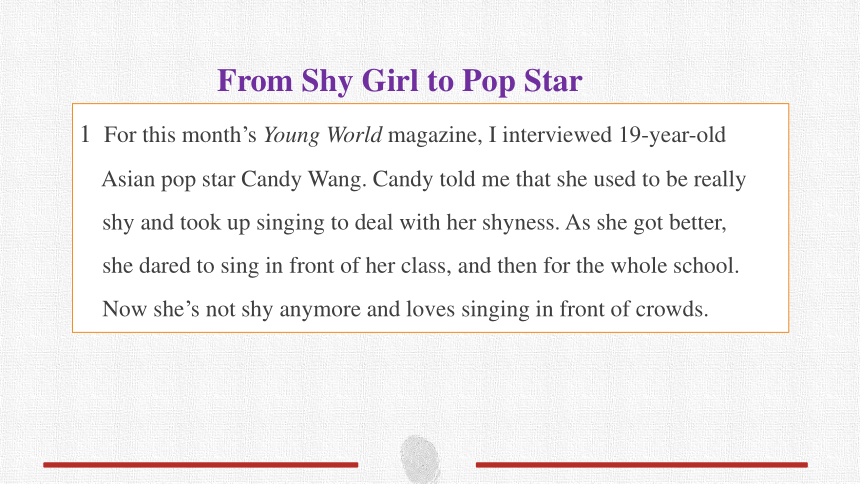
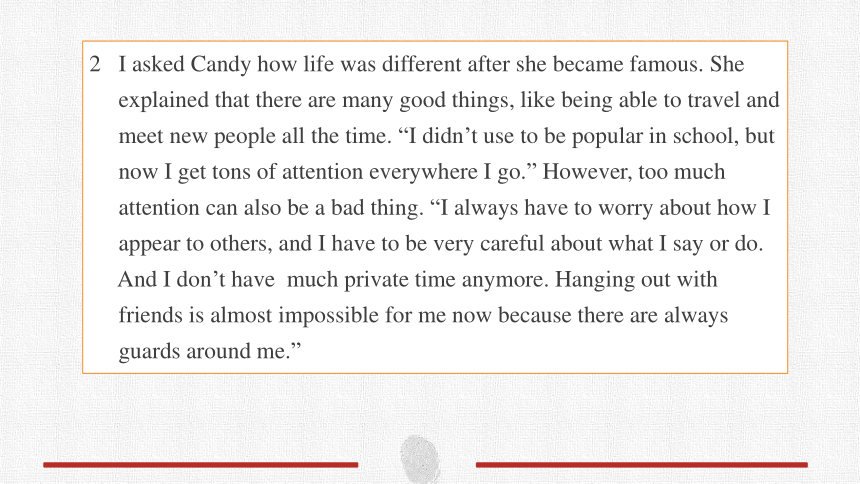
文档简介
(共20张PPT)
Unit 4 I used to be afraid of the dark.
The Second Period
Section A(3a—3c)
1. What was your life like in the past And now
2. How did your life change
Warming up
____ how Candy’s life has changed
____ Candy’s advice to young people
____ Candy’s background
2
3
1
Read the article and identify the paragraphs [1-3]
in which the information appears.
3a
1 For this month’s Young World magazine, I interviewed 19-year-old
Asian pop star Candy Wang. Candy told me that she used to be really
shy and took up singing to deal with her shyness. As she got better,
she dared to sing in front of her class, and then for the whole school.
Now she’s not shy anymore and loves singing in front of crowds.
From Shy Girl to Pop Star
2 I asked Candy how life was different after she became famous. She
explained that there are many good things, like being able to travel and
meet new people all the time. “I didn’t use to be popular in school, but
now I get tons of attention everywhere I go.” However, too much
attention can also be a bad thing. “I always have to worry about how I
appear to others, and I have to be very careful about what I say or do.
And I don’t have much private time anymore. Hanging out with
friends is almost impossible for me now because there are always
guards around me.”
3 What does Candy have to say to all those young
people who want to become famous “Well,”
she begins slowly, “you have to be prepared to
give up your normal life. You can never imagine
how difficult the road to success is. Many times I
thought about giving up, but I fought on. You really require a lot
of talent and hard work to succeed. Only a very small number of
people make it to the top.”
1. She used to be shy, but now she’s not shy ________.
3. She didnt use to be ________ in school, but now she gets lots
of attention.
4. She used to __________ with friends, but it is almost
impossible now.
5. She didn’t use to _____________ how she appears to others,
but now she does.
anymore
popular
hang out
worry about
Read the article again and complete the sentences about Candy.
3b
Interviewer: Candy, how has your life changed
Candy: I used to be shy, but now I’m not shy anymore.
Interviewer: How was your life different after you
become famous
Candy: ...
Suppose you are the interviewer and your partner is Candy. Ask and answer questions.
3c
1. Candy told me that she used to be really shy and took up singing to deal
with her shyness. 坎迪告诉我她过去非常害羞,于是开始唱歌来对付她的
羞怯。(教材第27页)
(1) take up 意为“开始做”,通常指开始某项工作、某个爱好等。尤其指做以
前从未做过的事或作为消遣的事。
take up doing sth. 意为“开始做某事”。
e.g. He is going to take up a hobby like painting. 他打算培养一个爱好,如绘画。
My father took up learning English at the age of forty. 我的父亲在40岁时开
始学英语。
Language Points
① deal with 与 do with 二者都可以用来表示“处理”,deal 侧重于方
式、方法,do 侧重于对象。在特殊疑问句中,deal with 与 how
连用,do with 则与 what 连用。
e.g. I don’t know how they deal with the problem. =I don’t know
what they do with the problem. 我不知道他们如何处理这个问题。
② deal with 还有一个需要注意的地方:在动词不定式短语 to deal
with中,必须带宾语。
e.g. I don’t know how to deal with it. 我不知道如何处理这件事。
(2)deal with 意为“对付;应付”。
e.g. He has learned to deal with all kinds of difficulties. 他已经学会了应 对各种困难。
辨析:deal with 与 do with
2. I always have to worry about how I appear to others, and I have to be very
careful about what I say or do. 我总是不得不为怎样出现在别人面前而担
忧,并且我必须注意我说的话和所做的事。(教材第27页)
worry about 意为“为……担心,为……担忧,为……烦恼”。
e.g. She always worries about some little things. 她总是为一些小事而烦恼。
Don’t worry about your son and he is well. 不要为你的儿子担心,他很好。
【拓展】worry 的过去分词可转化为形容词使用,构成 be worried about,相
当于 worry about。
e.g. Mothers are always worried about their children.
=Mothers always worry about their children. 母亲们总是为她们的孩子 担心。
3. Hanging out with friends is almost impossible for me now because there
are always guards around me. 现在对于我来说和朋友们一起闲逛几乎是不
可能的,因为在我的周围总是有警卫。(教材第27页)
(1) hang out 意为“闲逛;闲荡”。
e.g. Where does he hang out these days 这些日子他都在什么地方闲逛?
(2) guard 此处用作可数名词,意为“守卫,警卫”。
e.g. The camp guards changed every night. 营区的守卫每夜都更换。
【拓展】guard还可以用作动词,意为“防卫;警卫;看守”。
e.g. The dog guarded the house. 狗看守着房子。
4. ...you have to be prepared to give up your normal life. ……你必须准备好放弃你的正常生活。(教材第27页)
be prepared to do sth. 意为“准备好做某事,愿意做某事”。
e.g. I am prepared to take the exam.我为考试做好了准备。
【拓展】be prepared for 意为“为……做好准备”。
give up 意为“放弃”,其后可接名词、代词或动词-ing形式作宾语。give up 是动副型短语,后接代词作宾语时,应将代词放在give 和 up之间。
e.g. We should never give up hope. 我们应该永不放弃希望。
English is very important. Don’t give it up. 英语很重要,不要放弃它。
I will never give up doing sports because I hope I will be healthier.
我永远不会放弃运动,因为我希望我会更加健康。
一、语篇填空之基础训练
1. The film star refused to talk about his _________ life.
2. Those ____________ won’t allow the reporters to get into the building.
3. These pets ___________ a lot of care and attention.
4. Please tell me something about the ___________ of the movie.
5. Katie wants to be a reporter and then she can ___________ different people.
private
guards
require
background
Exercise
interview
guard background interview private
二、选择方框中的短语,用其正确形式填空
take up think about hang out deal with not ... anymore
1. The writer ________ writing for many years. He is very famous in the field.
2. Maybe nobody _________ outside because it’s too late.
3. He will _________ the problem by himself.
4. The monkey _________ appear __________.
5. I’m ____________ giving up my habit of staying up late.
takes up
deal with
anymore
thinking about
hangs out
didn’t
1. Learn the new words and expressions by heart.
2. Retell the story according to key words.
Homework
Unit 4 I used to be afraid of the dark.
The Second Period
Section A(3a—3c)
1. What was your life like in the past And now
2. How did your life change
Warming up
____ how Candy’s life has changed
____ Candy’s advice to young people
____ Candy’s background
2
3
1
Read the article and identify the paragraphs [1-3]
in which the information appears.
3a
1 For this month’s Young World magazine, I interviewed 19-year-old
Asian pop star Candy Wang. Candy told me that she used to be really
shy and took up singing to deal with her shyness. As she got better,
she dared to sing in front of her class, and then for the whole school.
Now she’s not shy anymore and loves singing in front of crowds.
From Shy Girl to Pop Star
2 I asked Candy how life was different after she became famous. She
explained that there are many good things, like being able to travel and
meet new people all the time. “I didn’t use to be popular in school, but
now I get tons of attention everywhere I go.” However, too much
attention can also be a bad thing. “I always have to worry about how I
appear to others, and I have to be very careful about what I say or do.
And I don’t have much private time anymore. Hanging out with
friends is almost impossible for me now because there are always
guards around me.”
3 What does Candy have to say to all those young
people who want to become famous “Well,”
she begins slowly, “you have to be prepared to
give up your normal life. You can never imagine
how difficult the road to success is. Many times I
thought about giving up, but I fought on. You really require a lot
of talent and hard work to succeed. Only a very small number of
people make it to the top.”
1. She used to be shy, but now she’s not shy ________.
3. She didnt use to be ________ in school, but now she gets lots
of attention.
4. She used to __________ with friends, but it is almost
impossible now.
5. She didn’t use to _____________ how she appears to others,
but now she does.
anymore
popular
hang out
worry about
Read the article again and complete the sentences about Candy.
3b
Interviewer: Candy, how has your life changed
Candy: I used to be shy, but now I’m not shy anymore.
Interviewer: How was your life different after you
become famous
Candy: ...
Suppose you are the interviewer and your partner is Candy. Ask and answer questions.
3c
1. Candy told me that she used to be really shy and took up singing to deal
with her shyness. 坎迪告诉我她过去非常害羞,于是开始唱歌来对付她的
羞怯。(教材第27页)
(1) take up 意为“开始做”,通常指开始某项工作、某个爱好等。尤其指做以
前从未做过的事或作为消遣的事。
take up doing sth. 意为“开始做某事”。
e.g. He is going to take up a hobby like painting. 他打算培养一个爱好,如绘画。
My father took up learning English at the age of forty. 我的父亲在40岁时开
始学英语。
Language Points
① deal with 与 do with 二者都可以用来表示“处理”,deal 侧重于方
式、方法,do 侧重于对象。在特殊疑问句中,deal with 与 how
连用,do with 则与 what 连用。
e.g. I don’t know how they deal with the problem. =I don’t know
what they do with the problem. 我不知道他们如何处理这个问题。
② deal with 还有一个需要注意的地方:在动词不定式短语 to deal
with中,必须带宾语。
e.g. I don’t know how to deal with it. 我不知道如何处理这件事。
(2)deal with 意为“对付;应付”。
e.g. He has learned to deal with all kinds of difficulties. 他已经学会了应 对各种困难。
辨析:deal with 与 do with
2. I always have to worry about how I appear to others, and I have to be very
careful about what I say or do. 我总是不得不为怎样出现在别人面前而担
忧,并且我必须注意我说的话和所做的事。(教材第27页)
worry about 意为“为……担心,为……担忧,为……烦恼”。
e.g. She always worries about some little things. 她总是为一些小事而烦恼。
Don’t worry about your son and he is well. 不要为你的儿子担心,他很好。
【拓展】worry 的过去分词可转化为形容词使用,构成 be worried about,相
当于 worry about。
e.g. Mothers are always worried about their children.
=Mothers always worry about their children. 母亲们总是为她们的孩子 担心。
3. Hanging out with friends is almost impossible for me now because there
are always guards around me. 现在对于我来说和朋友们一起闲逛几乎是不
可能的,因为在我的周围总是有警卫。(教材第27页)
(1) hang out 意为“闲逛;闲荡”。
e.g. Where does he hang out these days 这些日子他都在什么地方闲逛?
(2) guard 此处用作可数名词,意为“守卫,警卫”。
e.g. The camp guards changed every night. 营区的守卫每夜都更换。
【拓展】guard还可以用作动词,意为“防卫;警卫;看守”。
e.g. The dog guarded the house. 狗看守着房子。
4. ...you have to be prepared to give up your normal life. ……你必须准备好放弃你的正常生活。(教材第27页)
be prepared to do sth. 意为“准备好做某事,愿意做某事”。
e.g. I am prepared to take the exam.我为考试做好了准备。
【拓展】be prepared for 意为“为……做好准备”。
give up 意为“放弃”,其后可接名词、代词或动词-ing形式作宾语。give up 是动副型短语,后接代词作宾语时,应将代词放在give 和 up之间。
e.g. We should never give up hope. 我们应该永不放弃希望。
English is very important. Don’t give it up. 英语很重要,不要放弃它。
I will never give up doing sports because I hope I will be healthier.
我永远不会放弃运动,因为我希望我会更加健康。
一、语篇填空之基础训练
1. The film star refused to talk about his _________ life.
2. Those ____________ won’t allow the reporters to get into the building.
3. These pets ___________ a lot of care and attention.
4. Please tell me something about the ___________ of the movie.
5. Katie wants to be a reporter and then she can ___________ different people.
private
guards
require
background
Exercise
interview
guard background interview private
二、选择方框中的短语,用其正确形式填空
take up think about hang out deal with not ... anymore
1. The writer ________ writing for many years. He is very famous in the field.
2. Maybe nobody _________ outside because it’s too late.
3. He will _________ the problem by himself.
4. The monkey _________ appear __________.
5. I’m ____________ giving up my habit of staying up late.
takes up
deal with
anymore
thinking about
hangs out
didn’t
1. Learn the new words and expressions by heart.
2. Retell the story according to key words.
Homework
同课章节目录
- Unit 1 How can we become good learners.
- Section A
- Section B
- Unit 2 I think that mooncakes are delicious!
- Section A
- Section B
- Unit 3 Could you please tell me where the restroom
- Section A
- Section B
- Unit 4 I used to be afraid of the dark.
- Section A
- Section B
- Unit 5 What are the shirts made of?
- Section A
- Section B
- Review of Units 1-5
- Unit 6 When was it invented?
- Section A
- Section B
- Unit 7 Teenagers should be allowed to choose their
- Section A
- Section B
- Unit 8 It must belong to Carla.
- Section A
- Section B
- Unit 9 I like music that I can dance to.
- Section A
- Section B
- Unit 10 You're supposed to shake hands.
- Section A
- Section B
- Review of Units 6-10
- Unit 11 Sad movies make me cry.
- Section A
- Section B
- Unit 12 Life is full of the unexpected
- Section A
- Section B
- Unit 13 We're trying to save the earth!
- Section A
- Section B
- Unit 14 I remember meeting all of you in Grade 7.
- Section A
- Section B
- Review of Units 11-14
